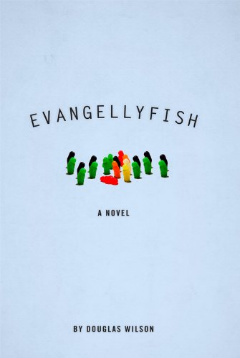What was the best novel of 2012? According to Christianity Today the answer is Doug Wilson’s Evangellyfish.
While he’s best known for nonfiction books of theology, Christian living, and education, Wilson, who pastors Christ Church in Moscow, Idaho, has written a raucous and ribald novel of manners about a megachurch pastor embroiled in a sex scandal.
I’m sure the book will scandalize a few of its readers, too. But as I read it, I couldn’t help but think that the outrageous tale surely suggests a few truths worth knowing. I interviewed Wilson about the book back in February. Here is our exchange:
You’re known primarily for nonfiction. Why a novel?
One of the things I have taught in my nonfiction work over the years (in articles, posts, sermons, etc.) is the centrality of story. To do this without even trying to make an attempt to tell a story would perhaps be a tad hypocritical. Stories are potent, and if I believe that, as I do, and I think I might have a chance of telling a decent one, then I should at least give it a try.
Like all good satire, the book will make you laugh as well as wince. The truth can rub the wrong way. What virtue is there in using satire?
I argue in one of my books (A Serrated Edge) for a biblical basis for satire. I believe that satire can accomplish a number of things that straight and serious denunciation really cannot do. One of them is to imitate a biblical form of dealing with high-handed sin. Jesus didn’t use a satiric edge on the prostitutes and tax-collectors, but he certainly did with the Pharisees.
Some might object that it is not wise for a Christian writer to point to our foibles like this, what with a non-believing world looking on and all. But I would argue that non-Christians don’t need to be informed about our scandals and hypocrisies. They know all about them already. What would be nice for them to be able to see is a biblical and Christian handling of these things, by which I mean with “a less than perfect tenderness.”
I wonder about the characters’ moral literacy. The cast is primarily Christian but many behave entirely other. How do we land in a world wherein self-gratification seems the highest virtue? And is that our real state of affairs?
Let me start with the last question. No, it is not our real state of affairs across the board, but it is our real state of affairs in certain quadrants of the church. A few years ago, I got a rejection letter for this manuscript because the set-up for the plot was so “out there.” After having received that rejection letter, the Ted Haggard scandal broke, which put my puny efforts into the shade. That made me happy.
With regard to the moral illiteracy, we land in that kind of world by gradations and degrees. No one walks with the Lord for many years, only to wake up one morning with a resolution to throw his life away. No, people drift there, slowly, gradually, inexorably, with a long string of what they believed to have been manageable compromises. But in the end, tolerating sin like that is like being a little bit pregnant.
Many of the characters — the pastor’s wife, Michelle Lester, for instance — complain about selfishness in others, though they are selfish to the extreme. A general poutiness of being put-upon manifests as well, as if everyone felt more sinned against than sinning. What explains that dynamic?
That dynamic is extremely common — every pastor has seen it in his counseling, and has seen it regularly. We always want to judge the other guy by his actions, and judge ourselves by our motives.
Is that reaction in ourselves a good warning sign for Christians?
Yes, it is certainly a warning sign. The old reprobate Ambrose Bierce defined a Christian as someone who believes the New Testament is a divinely inspired book, admirably suited to the spiritual needs of his neighbor. Take that eagerness to apply Scripture to other people (which Jesus talked about in his image of the moat and beam) and throw it away, and you have also thrown away countless family squabbles, marriage strife, church dissensions, and the rest of it.
What do you hope for the book?
I want this book to come across to intelligent readers as “funny, dark, and redemptive.” That is a tall order, and I will have to leave it for others to determine if I hit that target. But that at least is a good description of what the goal actually was.













